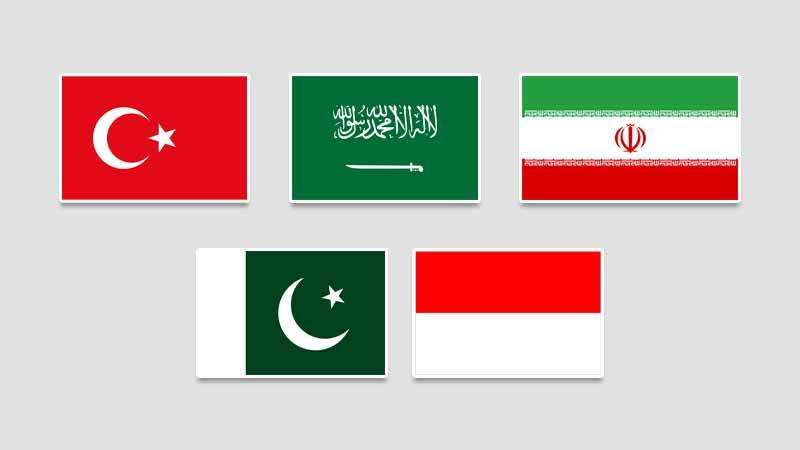In the modern world, several Islamic countries stand out due to their significant influence in global affairs. This article explores the five most powerful Islamic nations, taking into account their military strength, economic prowess, political influence, and cultural significance. These countries play a pivotal role in shaping the geopolitical landscape of the Muslim world and beyond.
1. Turkey
Overview: Turkey is a transcontinental nation, bridging Europe and Asia. With its strategic location, robust military, and growing economy, Turkey has emerged as a key player in international politics.
Military Power: Turkey boasts one of the largest and most advanced militaries in the world. It is a member of NATO, giving it a strategic advantage in military alliances and global defense initiatives.
Economic Influence: The Turkish economy is diverse and growing, with strong sectors in manufacturing, agriculture, and services. Its GDP ranks among the top in the region, making it an economic powerhouse in the Islamic world.
Political Significance: Turkey's political influence extends across the Middle East, Europe, and Central Asia. It has been a mediator in various international conflicts and plays a crucial role in regional stability.
2. Saudi Arabia
Overview: Saudi Arabia holds immense religious significance as the birthplace of Islam and home to its two holiest cities, Mecca and Medina. Its vast oil reserves also make it one of the wealthiest nations globally.
Military Power: Saudi Arabia has heavily invested in its military, making it one of the most formidable armed forces in the region. It frequently collaborates with Western powers for defense and security.
Economic Influence: The Saudi economy is largely driven by its oil exports, which constitute a significant percentage of global oil production. The nation's Vision 2030 initiative aims to diversify its economy and reduce dependence on oil.
Political Significance: Saudi Arabia wields considerable influence within the Organization of Islamic Cooperation (OIC) and the Gulf Cooperation Council (GCC). Its policies often shape the geopolitical dynamics of the Middle East.
3. Iran
Overview: Iran is a central player in Middle Eastern politics, known for its rich history, cultural heritage, and significant natural resources.
Military Power: Iran has a large and capable military, with substantial missile and drone capabilities. Its strategic military initiatives have a considerable impact on regional security dynamics.
Economic Influence: Despite facing international sanctions, Iran has a diversified economy with strengths in agriculture, energy, and manufacturing. Its vast reserves of oil and natural gas are crucial to its economic standing.
Political Significance: Iran's influence extends through its support for various regional groups and its strategic alliances. It is a key member of the Non-Aligned Movement and has a significant say in Middle Eastern geopolitics.
4. Pakistan
Overview: As the second-largest Muslim-majority country, Pakistan is a nuclear-armed nation with a strong military and a growing economy.
Military Power: Pakistan's military is one of the most disciplined and capable in the Islamic world. Its nuclear capabilities add to its strategic importance on the global stage.
Economic Influence: Pakistan's economy is rapidly developing, with key sectors in textiles, agriculture, and technology. Its strategic location makes it a crucial player in regional trade and connectivity projects.
Political Significance: Pakistan plays a vital role in South Asian politics and has strong ties with major global powers. It is an active member of the Organization of Islamic Cooperation (OIC) and other international bodies.
5. Indonesia
Overview: Indonesia is the world's most populous Muslim-majority country and a significant player in Southeast Asia.
Military Power: Indonesia has a growing military force, with investments in modernizing its capabilities to ensure regional security and maritime dominance.
Economic Influence: As a member of the G20, Indonesia has one of the largest economies in the world. Its economy is diverse, with strong industries in manufacturing, agriculture, and services.
Political Significance: Indonesia's influence in the Islamic world is substantial due to its large Muslim population. It plays a key role in ASEAN and other international organizations, advocating for the interests of the Muslim community globally.
Conclusion
These five countries - Turkey, Saudi Arabia, Iran, Pakistan, and Indonesia - are not only powerful within the Islamic world but also hold significant sway on the global stage. Their military capabilities, economic strength, and political influence make them pivotal players in international affairs. Understanding the roles these countries play can provide deeper insights into global geopolitics and the future of the Muslim world.








.svg)
